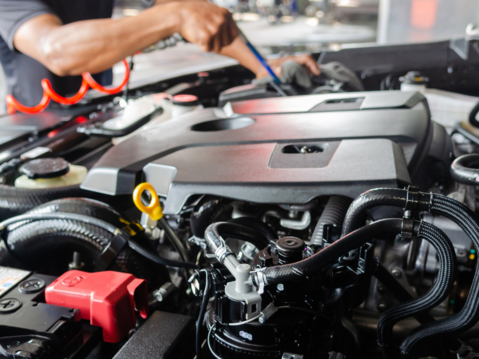Car Engines Explained
Here is an overview of the benefits, technology and models of the most common engine types currently seen on UK roads.
Choosing the right engine for your needs requires understanding the strengths of the engine options available. For buyers debating powertrain options, understanding these pros and cons will help you select the ideal engine for any vehicle purchase.
Here is an overview of the benefits, technology and models of the most common engine types currently seen on UK roads.
Petrol Engines

Petrol engines remain popular with car buyers thanks to their lower costs, smooth power delivery and fuel availability. Most petrol engines run on a 4-stroke combustion cycle using spark plugs for ignition. Turbocharging is frequently added to increase power while maintaining fuel efficiency. Petrol engines come in inline 3, 4 and 6 cylinder configurations. Near enough every automotive brands like Ford and Vauxhall, BMW and Mercedes offer a range of turbocharged petrol engines across their model lines.
Petrol engines offer advantages that make them a popular choice for many drivers. Maintenance costs are lower compared to diesel, with no particulate filter to worry about. Petrol engines also tend to be lighter than diesel, which benefits handling. For short trips or low annual mileage, the lower purchase price of petrol vehicles can make better financial sense.
The gradual shift towards hybrid and EV also means petrol cars are less likely to face emissions restrictions or charges in cities compared to diesel.
Diesel Engines

Diesel engines have faced pollution challenges but remain a common choice for drivers doing higher mileage. Their compression ignition cycle gives strong torque and fuel efficiency. Turbocharging helps increase power while keeping fuel consumption low. Many people still opt for diesel to minimise fuel costs. Popular models with diesel options include the Ford Focus and BMW 3 Series and the VW Golf
Diesel also delivers exceptional fuel efficiency and reduced CO2 emissions, making them top choice for high-mileage drivers. Their range between fill ups is also impressive, reducing time spent at petrol stations. Servicing and maintenance costs are inexpensive on modern diesel cars, especially for models with long service intervals. Diesel's fuel efficiency and torque also make it a popular choice for fleet and commercial vehicles like taxis and vans. For buyers needing an engine optimised for the economy and real-world pulling power, the benefits of diesel still make it a viable option despite recent emissions challenges.
Hybrid

Hybrid vehicles are growing in popularity. Combining electric motors with petrol engines increases efficiency. The electric motor assists the combustion engine and can drive at low speeds. Toyota pioneered hybrid tech on models like the Prius and Corolla. Other brands with hybrid options include Honda, Hyundai and Kia.
Hybrids achieve range and convenience compared to petrol but with enhanced economy and lower emissions. Regenerative braking recaptures energy and charges the battery pack. Many hybrids carry tax advantages as their emissions fall below key thresholds. With batteries that charge on the move, hybrids avoid the range anxiety of pure EVs. For buyers who value green and low running costs but need total flexibility, hybrids offer a best-of-both-worlds solution.
Plug-in Hybrid Engines (PHEV)

Plug-in hybrids (PHEVs) offer extended electric-only driving range. Once the battery charge depletes, a petrol engine kicks in. PHEVs allow drivers to optimize electric and petrol power based on driving needs. Models like the Mitsubishi Outlander PHEV and BMW 330e allow electric commuting but long petrol-powered trips.
PHEVs can drive an initial distance of typically 20-40 miles on electric-only mode, allowing drivers to run errands and commute while emitting zero emissions. Once the battery depletes, an efficient petrol engine seamlessly takes over. This provides total range confidence when longer trips are required. Many PHEVs allow drivers to choose when to optimise electric or petrol use. The twin-powertrain flexibility lets PHEV owners benefit from low-cost electrified mobility around town plus unlimited petrol-powered range for longer journeys. For UK drivers wanting electric benefits without range anxiety, plug-in hybrids offer the best of both worlds.
Electric

EVs are growing fast as charging infrastructure expands. EVs use large battery packs and electric motors for zero-emissions driving. Popular EVs in the UK include the Tesla Model 3, the Nissan Leaf and the VW ID range. Advantages include low running costs and tax incentives. Range and charging times are still disadvantages versus petrol or diesel.
EVs produce no tailpipe emissions during driving, improving local air quality. Their efficiency equates to lower running costs, with electricity being cheaper per mile than petrol. EV drivetrains are smooth and quiet too. Home charging is convenient and avoids petrol station visits. Government incentives and grants can lower purchase costs and tax bills. The public charging infrastructure keeps improving and will extend usability. As renewable energy expands, EVs will enable truly sustainable mobility. For drivers who care about the environment, cutting emissions and running costs, zero-emissions electric cars are compelling ownership prospects.
We stock every type of vehicle here at West Motors from SUVs to small city cars. Take a look at our latest stock and book your test drive.



